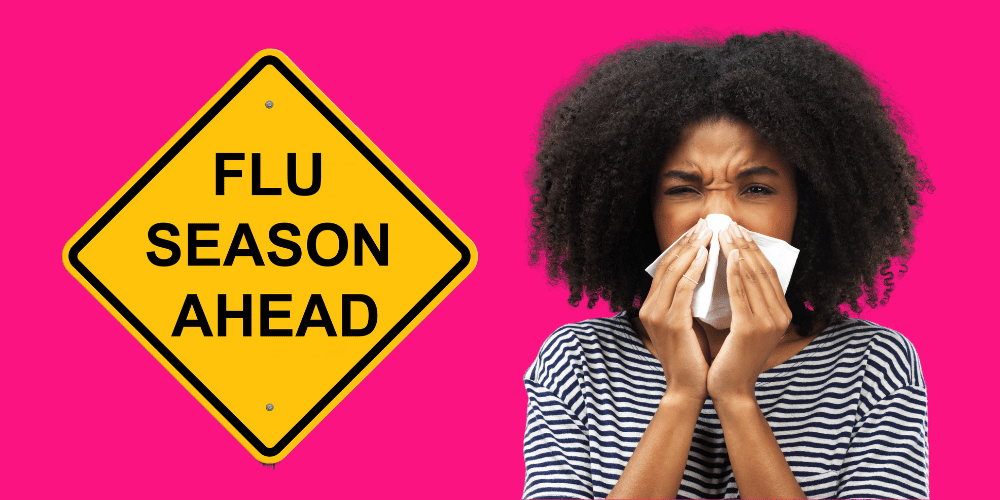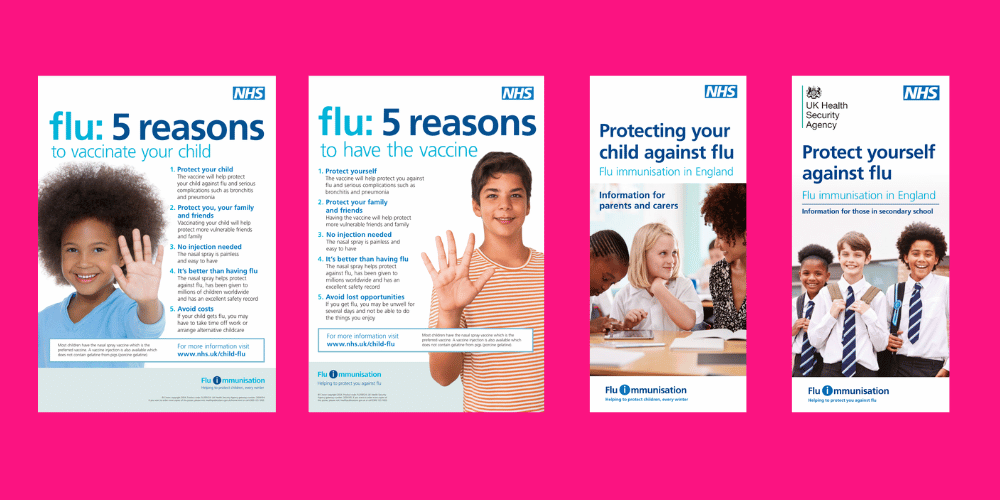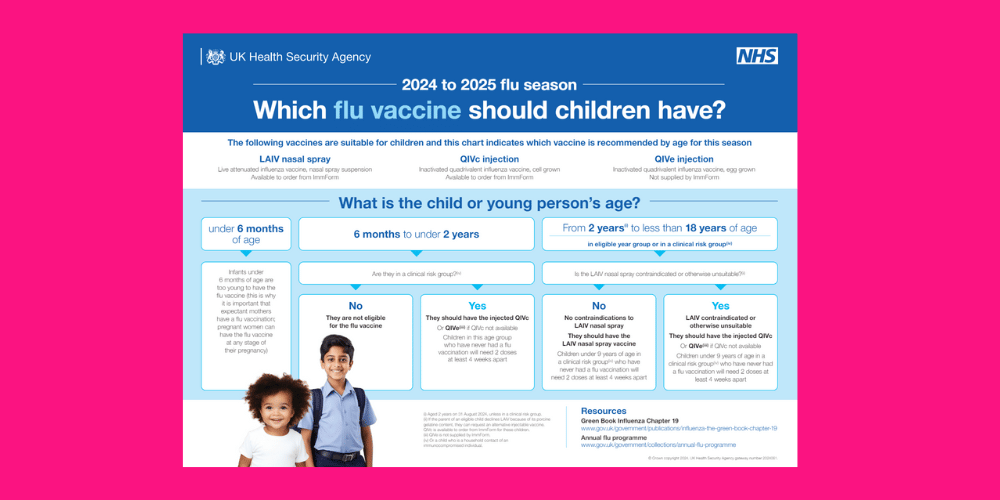
Before you ask, no, we haven’t gone back in time…it’s still 2024 and despite it being the middle of the summer, we are in fact, fast approaching the flu season! The NHS England has now confirmed the start dates for the 2024/25 flu vaccine programme with two main risk groups prioritised for the initial rollout; Pregnant Women and Children. This decision is grounded in comprehensive evidence and recommendations from the Joint Committee on Vaccination and Immunisation (JCVI). Understanding why these groups are prioritised highlights the intricate strategies of public health and the complexities involved in managing flu season.
The service will commence according to the following schedule:
From 1st September 2024, vaccination will be offered to:
From 3rd October 2024, vaccination will be offered to:

The JCVI has recommended starting the flu vaccination programme for most adults at the beginning of October for this years flu programme. This decision is based on evidence showing that the effectiveness of the flu vaccine can diminish over time in adults. This timing ensures that the majority of vaccinations are completed by the end of November, aligning protection with the peak flu season, typically occurring in December or January. Vaccinating closer to this peak period optimises protection when the risk of flu is highest.
In contrast, flu circulation among children usually precedes that in adults. Consequently, the JCVI recommends starting the children’s flu vaccination programme in September. This early start provides children with timely protection and helps reduce transmission to the broader population. Since vaccine protection lasts longer in children, early vaccination is effective in both safeguarding children and mitigating the spread of the virus.
The public health impact of vaccinating younger children is significant. Therefore, school-aged immunisation providers are encouraged to schedule vaccinations for primary school children early in the season, aiming to complete them by mid-December. This approach ensures that children are protected before the peak flu period, further contributing to community-wide immunity.
Pregnant women are an exception to the advice on delaying the start of flu vaccinations for most adults. There are three critical reasons for prioritising flu vaccination for pregnant women:
Given these factors, the NHS will begin vaccinating pregnant women from 1 September 2024. This timing aligns with the need to protect both the mother and the baby before and after birth, ensuring comprehensive coverage throughout the flu season.

Pregnant women experience changes in their immune, heart, and lung functions, making them more susceptible to severe illness from flu. Contracting flu during pregnancy can lead to serious health complications, including pneumonia, hospitalisation, and, in severe cases, death. Additionally, flu infection can increase the risk of preterm labour, smaller birth weight and adverse neonatal outcomes. Babies under six months are highly susceptible to flu complications. Vaccinating pregnant women with the flu vaccine ensures that newborns receive some protection during the early months of life, when they are unable to receive vaccination themselves.
Worryingly, last flu season, the overall flu vaccination rates for pregnant women were the lowest uptake on record since the 2011-2012 season, with just 32.1% of this risk group vaccinated down from 35% from the previous year, according to data provided by the UKHSA. It is crucial to enhance efforts to reach this vulnerable group, ensuring they understand the importance of flu vaccination in pregnancy and the associated risks of remaining unvaccinated.

Children under the age of five, are at a higher risk of developing serious flu-related complications such as bronchitis, pneumonia, dehydration, and potentially neurological or cardiac issues. Their immune systems are still developing, making them less equipped to fight off infections effectively. Vaccination in children can also provide indirect protection by lowering flu transmission from children to other individuals, in particular those who are very vulnerable.
Since the start of the children’s flu vaccination programme, studies have demonstrated that vaccinating a substantial number of children has decreased flu circulation in communities. As a result, there has been a reduction in flu-like illness consultations at GP offices for both vaccinated children and the broader community, as well as a decline in hospital admissions due to flu.
Yet, similar to pregnant women, vaccine uptake in children is still well below the recommended target rate. According to data from the UKHSA, combined vaccine uptake in those aged 2 and 3 years was 44.4% last season. It is essential to find more effective ways to communicate the importance of vaccination and boost uptake in these age groups.
The NHS’s prioritisation of women and children for flu vaccinations is a well-considered strategy aimed at maximising public health benefits. By aligning vaccination timing with the specific needs and risks of different groups, the NHS ensures that protection is both timely and effective. As flu season approaches, this targeted approach helps safeguard the most vulnerable, reducing the overall burden of influenza on individuals and communities.

Are you prepared for flu season? As healthcare providers, we are relied upon for trusted guidance and advice, and there are various ways we can contribute to enhancing vaccination rates among vulnerable priority groups such as pregnant women and children. Reflect on the steps you can implement in your practice, from awareness campaigns and outreach efforts to collaborating with community partners and providing training and support for healthcare staff.

The UKHSA have published several resources and posters over on their Annual Flu Programme website that can be used during the campaigns to help get the message across and provide information to children and their parents/caregivers in schools and practices.

The UKHSA have also published a poster for Which flu vaccine should children have? that you can serve as a helpful reminder on the risk groups and recommended vaccines.

At Health Academy we have a range of flu training options suitable for you. Whether you prefer your training to be E-learning, Virtual or Face-to-Face – we can cater to all needs. Head over to our Flu Hub to find out more and secure your training date now.
We are also running a FREE lunchtime session on Promoting Flu Vaccine Uptake and Reducing Vaccine Hesitancy in Practice on the 2nd August at 12:30pm – don’t miss out and book your spot today.
Giving you written and video content to answer all your questions on primary care education from Phlebotomy to Travel Health.
Subscribe now to be kept updated with our latest posts and insights.
Start typing to search courses, articles, videos, and more.